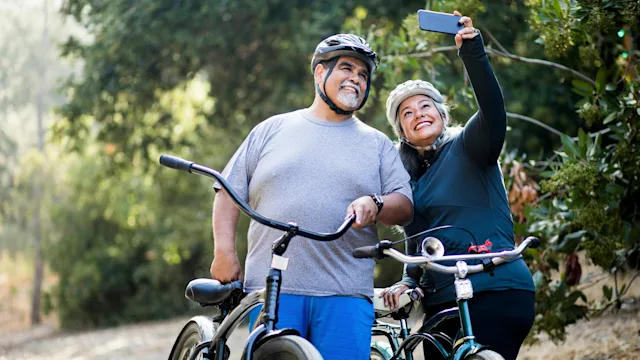Key takeaways
As people get older, their metabolism starts to slow down.
A lower metabolism can lead to weight gain. People generally gain a pound or two each year as they get older, in part due to a lower metabolism.
You can give your metabolism a boost as you get older by eating more protein and building muscle.
You may have noticed that maintaining your weight gets harder as you get older. Most adults gain 1 to 2 pounds each year from the time they're 40 until they’re about 65 years old. While this may not sound like a lot, over time, it can add up. Higher weights and BMIs are associated with a higher risk of medical conditions like high blood pressure, diabetes, and fatty liver disease.
But why does your weight start to creep up as you get older? The answer starts — but doesn’t end — with your metabolism. Here’s how your metabolism changes over your lifetime and what you can do to give it a boost.
Does metabolism slow with age?
Yes. Your metabolism slows down as you get older. Every 10 years, your metabolism drops 1% to 2%.
Search and compare options
Metabolism is a term that describes all the chemical reactions that take place in your body each day to create energy. Basically, your metabolism is the process that converts the calories in the food you eat into energy.
A higher metabolism means that your body cycles through more reactions to create more energy each day. A lower metabolism means that your body cycles through fewer reactions and creates less energy in a given day.
As you get older, you start to lose muscle mass. Muscle tissue goes through a lot of energy in a day. Other tissue in the body also uses up energy, but not as much as muscle. So the less muscle you have, the less energy your body needs to get through each day. That means your body stops cycling through so many chemical reactions and your metabolism slows down.
How does this lead to weight changes? If you eat more calories than your metabolism needs each day, your body will store the extra calories for future use and this can lead to weight gain.
As you get older, you can gain weight even if you haven’t changed what or how much you eat. As your metabolism slows down, your daily calorie needs go down, too. So your usual calorie intake now becomes too much and can lead to weight gain.
What is metabolic age?
Your metabolic age is a measurement of how well your body works. You want your metabolic age to be as close to your chronological age as possible. If your metabolic age is older than your chronological age, it can be a sign that your body is functioning like it’s much older than it is. So metabolic age is a measurement of your body’s overall health.
Read more like this
Explore these related articles, suggested for readers like you.
Experts calculate metabolic age based on the basal metabolic rate (BMR). BMR estimates how many calories you need for your body to work normally while at rest.
Your BMR is largely determined by your genes. But things like your muscle mass and physical activity level also influence your BMR. People with lower muscle mass and who are less active will have slower BMRs and higher metabolic ages.
Although you don’t want a high metabolic age and low metabolism, you also don’t want to have a metabolism that runs too fast. This is called hypermetabolism. Studies have shown that while a fast metabolism keeps your body’s cells running well, hypermetabolism makes your body age faster.
Can you boost your metabolism as you get older?
Yes. Your metabolism is controlled by your genes and your age, two things you can’t change. But that doesn’t mean there’s nothing you can do to help your metabolism stay strong.
Here are five tips to boost your metabolism:
1. Build muscle
Building muscle will bump your metabolism. It will also help your overall health. A healthy muscle mass lowers your risks for falls and helps you maintain your balance, mobility, and strength. You can build muscle with strength-training exercises.
“This is where the importance of resistance training with the use of bands and weights can help significantly with maintaining and even boosting metabolism,” said Dr. Joseph St. Pierre, from the medical weight loss department at Hartford HealthCare.
Talk with your healthcare provider before starting with any new exercise routines. Your healthcare provider can let you know whether certain activities are safe for you. They may also have suggestions for exercises and fitness experts who can work with you. You can also contact your local health department, senior centers, and gyms to see if they have recommendations for programs aimed at older adults.
2. Eat more protein
You need protein to build muscle.
“Without adequate protein intake,” St. Pierre said, “we will be unable to maintain our existing muscle mass nor be able to build any new additional muscle mass.”
Opt for lean protein options like chicken, fish, beans, and eggs. You can also add high-protein snacks into your routine like hummus, Greek yogurt, roasted chickpeas, and almonds.
Also, it takes more energy to digest protein than other kinds of food, according to St. Pierre. “This is called the thermic effect,” St. Pierre said. The greater energy needed to digest protein boosts your metabolism.
3. Balance your hormone levels
As you get older, your hormone levels will start to change. Low levels of certain hormones, like growth hormone and thyroid hormone, can slow down your metabolism.
During menopause, estrogen levels also drop. Lower levels of estrogen is also linked to a slower metabolism, which is why many people notice a change in their weight during and after menopause.
Talk with your healthcare provider about whether you should have your hormone levels checked. Treatment with hormone supplements may help stabilize your metabolism.
4. Stay away from restrictive diets
Some people try to make up for their lower metabolism by restricting how much they eat. It may seem logical that eating less food (and calories) will help you lose or maintain your weight. But being too restrictive about what you eat can actually make things worse. Your body senses that you’re not getting enough calories and it signals to your metabolism that it’s time to slow down.
Instead, try to eat regular meals that help your metabolism stay on track. It can also help to eat your largest meal in the morning. There’s some evidence that eating a large morning meal boosts metabolism. You can opt for a protein-rich, hearty breakfast and then smaller meals at lunch and dinner.
5. Try high-intensity interval training (HIIT)
High-intensity interval training (HIIT) is a type of exercise that combines short bursts of intense activity with stretches of lower intensity movement. The combination of high-intensity and low-intensity activity helps to build muscle and improve heart health and endurance.
But, don’t start HIIT until you talk with your healthcare provider. HIIT stresses your heart and lungs, so you want to make sure you have the all-clear to participate in these activities safely. You also want to work with fitness experts who are knowledgeable about working with older adults. They can modify your approach so that you can engage in HIIT safely.
The bottom line
Your metabolism slows down as you get older. This can lead to steady weight gain over time. You can’t control your age or genetics, but there are steps you can take to boost your metabolism. Focus on building muscle through strength-training exercises and eating enough protein each day. Getting enough activity and the right nutrition can give your metabolism a jump start and keep you healthy as you get older.

Why trust our experts?


References
Agency for Healthcare Research and Quality. (2013). Strategies to prevent weight gain among adults.
Bitti, S. R., et al. (2021). GH replacement in the elderly: Is it worth it? Frontiers in Endocrinology.
Bo, S., et al. (2015). Is the timing of caloric intake associated with variation in diet-induced thermogenesis and in the metabolic pattern? A randomized cross-over study. International Journal of Obesity.
Columbia University Irving Medical Center. (2023). Overactive cell metabolism linked to biological aging.
Harvard Health Publishing. (2021). The truth about metabolism.
Sánchez López de Nava, A., et al. (2022). Physiology, metabolism. StatPearls.
Vásquez-Álvarez, S., et al. (2021). Metabolic age, an index based on basal metabolic rate, can predict individuals that are high risk of developing metabolic syndrome. High Blood Pressure and Cardiovascular Prevention.


















